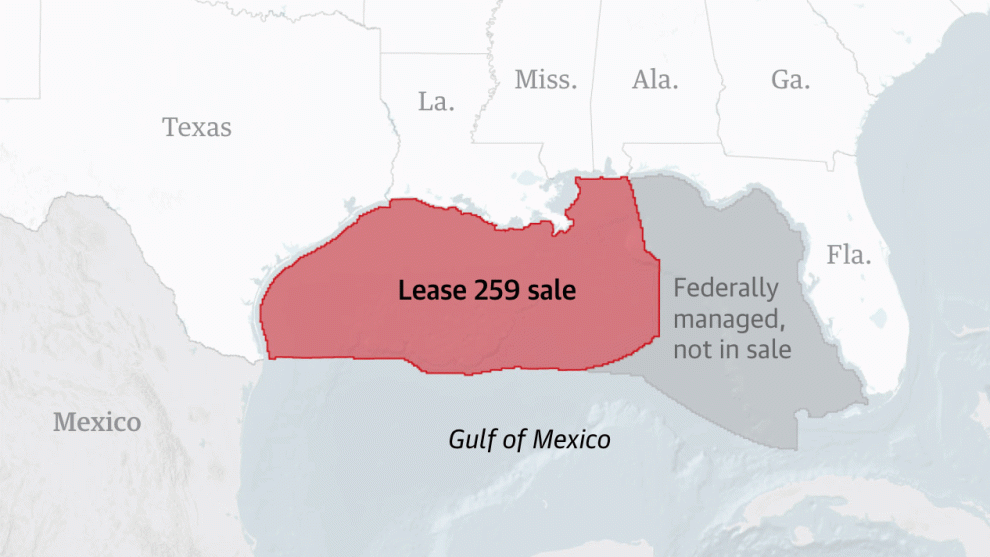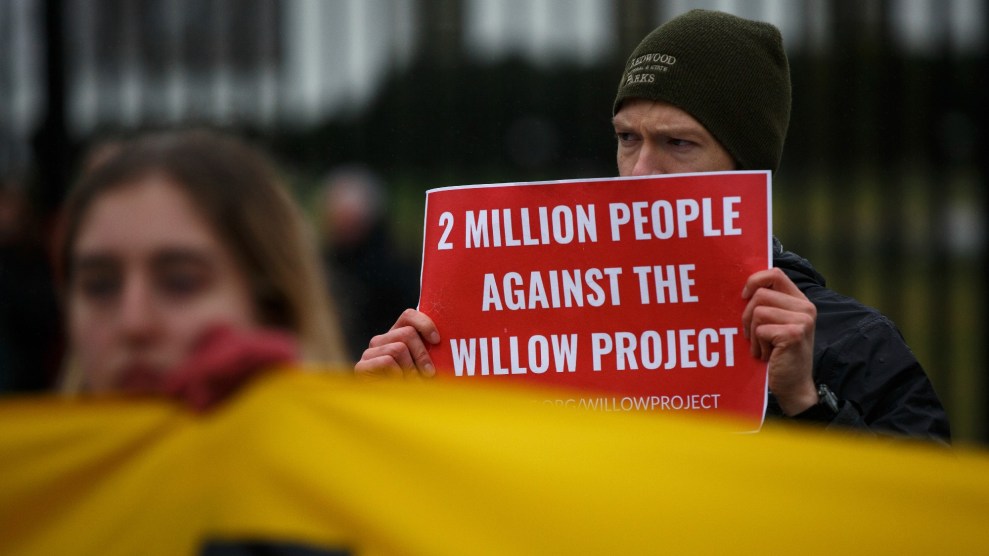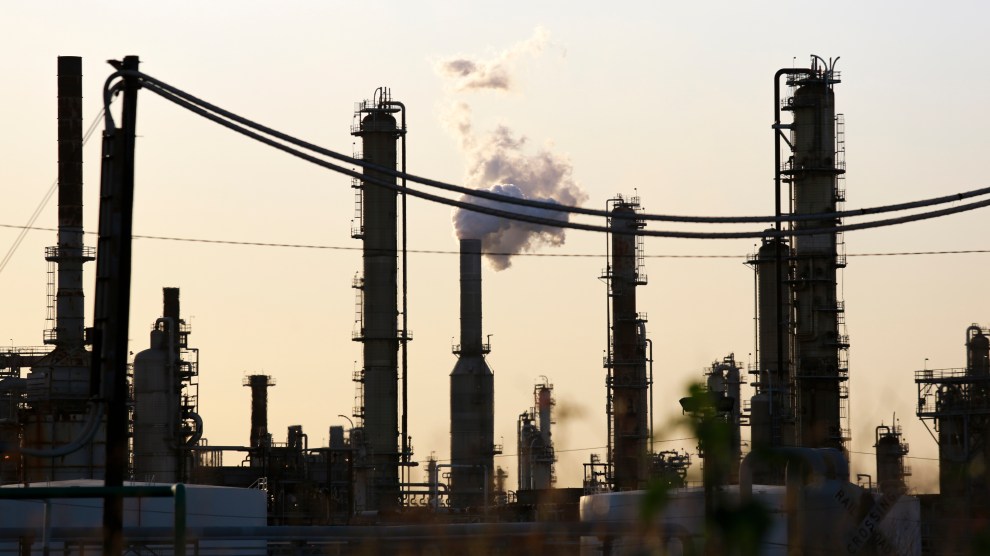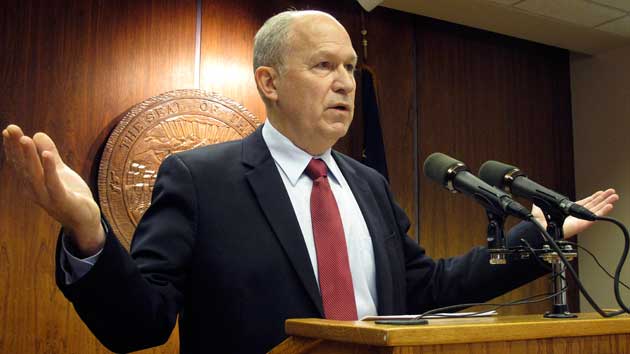
The sale of lease 259 could lead to the extraction of more than 1 billion barrels of oil and 4.4 trillion cubic feet of gas over 50 years.Guardian Graphic
This story was originally published by the Guardian and is reproduced here as part of the Climate Desk collaboration.
An enormous swathe of the Gulf of Mexico, spanning an area the size of Italy, was put up for auction on Wednesday for oil and gas drilling, in the latest blow to Joe Biden’s increasingly frayed reputation on dealing with the climate crisis.
The Department of the Interior offered up a vast area of the central and western Gulf, including plunging deep water reaches, for drilling projects that will stretch out over decades, despite scientists’ urgent warnings that fossil fuels must be rapidly phased out if the world is to avoid disastrous global heating. The auctions also come despite Biden’s own pre-election promise to halt all drilling on federal lands and waters.
A total of 313 tracts of ocean, spanning 1.6 million acres, received high bids during the auction, the administration announced on Wednesday afternoon. There were 32 fossil fuel companies involved in the auction, collectively bidding $310 million for drilling rights. The amount offered by the federal government was much larger than this, however. The bids will be evaluated by the government in the coming months before leases are issued.
In all, 73.3 million acres, an area roughly the size of Italy, was made available to drilling companies, less than a month before the 13th anniversary of the Deepwater Horizon oil spill disaster. The sale, known as lease 259, had the potential to extract more than 1 billion barrels of oil and 4.4 trillion cubic feet of gas over the next 50 years, according to the federal government.
The auctions come just two weeks after Biden’s administration approved the controversial Willow project, a drilling endeavor in the remote tundra of Alaska’s arctic that will remove more than 600 million barrels of oil over its lifetime, and the two actions have caused major alarm among those in favor of a livable climate, including Biden’s usual allies.
“For the first half of his presidency, Joe Biden led on climate with transformative vision but in the second half he seems to be signaling a disastrous climate U-turn,” Ben Jealous, executive director of the Sierra Club and a prominent progressive, said.
Last summer, Biden signed the Inflation Reduction Act (or IRA), a landmark bill that the president lauded as the “biggest step forward on climate ever”. The sweeping legislation has billions of dollars in support for renewable energy projects and electric car subsidies, but it also included stipulations that large areas of the Gulf of Mexico and Alaska be made available for fossil fuel drilling in order to appease Joe Manchin, a pro-coal Democratic senator and key swing vote.
Climate campaigners mostly considered the trade-off to be worthwhile as the resulting emissions cuts should still be large, but the new glut of drilling could wipe out much of the benefits of wind and solar projects over the next decade.
“If this continues, all of the good Biden has done for the future will be undone by Biden himself,” said Jealous. “If he’s making a political calculation, he’s making a wrong one. He’s breaking a major promise on drilling and by going back on his word he will inspire many young people to stay at home rather than voting in 2024. His decisions appear to be rooted in the political and economic calculus of the last century, not this one.”
The White House has pointed to a series of complicating factors to its climate agenda, such as Russia’s invasion of Ukraine, which has sped up the construction of oil and gas export terminals in the US, bound for European allies, as well as a closely divided Congress and various legal obstacles.
On Friday, Biden said that he was inclined to block the Willow project, only to be told by administration lawyers that ConocoPhillips, the owner of the project lease, would likely sue and win to secure it. “My strong inclination was to disapprove of it across the board but the advice I got from counsel was that if that were the case, I may very well lose,” the president said.
The administration has also indicated that the terms of the Inflation Reduction Act also compel the Gulf of Mexico sales, although opponents argue that such a large area did not need to be put up for sale.
A separate, even larger, tract of the gulf, known as lease 257, has been enmeshed in a legal battle and the latest lease blocks will also likely end up in court, with a coalition of green groups suing this month to stop it. It’s not been clear how much interest there will be from industry—an auction of leases in December for the Cook Inlet in Alaska yielded just one bid.
“These leases were brought back to life by the IRA but there was no legal reason to offer almost the entire Gulf of Mexico to the oil and gas industry,” said George Torgun, an attorney at Earthjustice, which claims the drilling, aside from its climate impacts, will further burden communities of color who live beside polluting refineries along the coast and endanger the Rice’s whale, a species endemic to the gulf with fewer than 50 individuals remaining.
“This is locking in decades of fossil fuel use when we should be heading in another direction,” said Torgun. “It’s out of step with what Biden himself has called the existential threat of climate change.”
The department of interior’s bureau of ocean energy management, which is overseeing the lease sales, did not respond to a request for comment. The National Ocean Industries Association, a lobby group for offshore drillers, has said that allowing the leases provides a “key component of a national energy strategy that will ensure Americans can continue to have access to fundamental domestic energy that is produced safely, sustainably, and responsibly.”
The Earth’s climate system is uncompromising, however. The recent Intergovernmental Panel on Climate Change (IPCC) report warned that 3 billion people around the world are already suffering from severe climate impacts and that the world’s temperature will likely rise beyond 1.5C, unleashing much worse misery, within a decade if fossil fuels aren’t radically pared back.
“The truth is Earth doesn’t care about politics, it cares about greenhouse gases in atmosphere,” said Alex Ruane, a Nasa climate scientist and lead IPCC author. “Even since the last IPCC report in 2021 we have put a substantial chunk of the carbon budget into the atmosphere. Action and inaction are both choices and at present we are getting closer every day to those temperature targets.”












